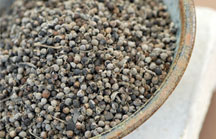By Marcy ClarkHow Natural Ingredients Can Increase Your Chances of Getting Pregnant Naturally
The latest research shows that many common natural products found in our grocery stores and on natural supplement shelves may provide the keys to unlocking infertility and helping both men and women increase their chances of conception. Our friend Chavah, the co-founder of BeeFertile, shared with us some of the latest research on fertility:
- Bee Pollen houses all of the necessary components of life and has been recognized to aid in diminished sex desire and energy, alleviating menstrual cramps, improving fertility in both men and women, and relieves prostate problems. A recent study showed bee pollen significantly improved sperm production in men (Lewis). Another study was conducted that demonstrates how bee pollen can significantly affect inflammation and swelling of the prostate gland. The double-blind controlled study of 93 patients, in which a placebo was given to 43 men, and bee pollen to the remaining 50. Forty-six men out of the fifty who took the bee pollen were successfully treated, while the control group did not experience any significant improvement (Leander; Leander, et al.)
- Royal Jelly is extremely nutrient-rich and can improve fertility in both men and women. It can also help increase the quality of sperm in men and eggs in women. Royal Jelly has been an answer for many of those suffering from PMS, low estrogen levels, and irregular menstrual cycles. A recent study conducted the effects on royal jelly and male rabbits suffering ‘summer infertility’. When royal jelly was administered, they discovered an increase in seminal plasma fructose, a significant boost in testosterone level, ejaculated volume, and increased sperm total output. It is also worthy to note a decrease in abnormal sperm and dead sperm and an increase in improved sperm motility. The conclusion of the study confirmed that royal jelly administered to heat-stressed male rabbits counteracted their ‘summer infertility’ and improved their overall physiological state (Elnagar).
- Chasteberry, also known as Vitex, has been shown to help to normalize female sex hormones, lengthen luteal phase and lower high prolactin levels, targeting some of the causes of infertility. A clinical study was performed, sixty-seven women with ovulatory/cycle problems were treated with vitex, which resulted in a “marked improvement of progesterone levels during the luteal phase, earlier ovulation, and thirty-eight achieved pregnancies” (Berger).
- Red Raspberry Leaf contains fragrine, an alkaloid, which helps to tone and strengthen the pelvic region, particularly the uterine lining, thus lengthening the luteal phase. By toning the uterus, it also helps prevent miscarriage and postpartum hemorrhage, due to a relaxed or atonic uterus. (Burn JH, Withell ER)
Vitamin C consumption is essential in aiding proper hormone function. In a recent study, it was found that a moderate amount of supplemental vitamin C improves hormone levels and increases fertility in women with luteal phase defect. Luteal phase failure arises when ovaries don’t produce the progesterone needed to admit implantation of a fertilized egg (Henmi). Other preliminary clinical research suggests that taking at least 400mg daily might improve fertility, resulting in ovulation and pregnancy in anovulatory women (Igarashi; Wilson).
- Damiana aids in toning and stimulating the reproductive organs. It can increase and balance hormones levels, and likewise, stimulate female eggs. Damiana also has an aphrodisiac effect on women that can aid in conception. Damiana’s main strength is to aid in impotence. It can encourage circulation to the male and female sexual organs. A study conducted on Damiana (Turnera Diffusa) concluded that the results support the use of turnera diffusa as an aphrodisiac in traditional medicine and suggest possible therapeutic properties of turnera diffusa on sexual dysfunction (Estrada-Reyes).
- If Zinc is supplemented in the diet, testosterone and sperm count levels can be re-established to acceptable levels. Zinc is found in high concentration in sperm, and is vital in making the outer layer of the sperm, as well as the tail. Some research suggests that a documented daily consumption of folic acid plus zinc sulfate can increase sperm count in subfertile men (Wong). During a trial involving 14 males, zinc was administered over a 4 month period. Results demonstrated a significant improvement in sperm count, a number of advanced motile and normal spermatozoa, and acid phosphates activity. Three wives of patients conceived (Tikkiwal).
- Also for men, L-Carnitine is an amino acid that is necessary for proper function of sperm cells and in a recent study improved sperm concentration, motility and morphology in men with poor sperm quality, resulting in a significantly higher pregnancy rate. The researchers note that four unplanned pregnancies were achieved during the experiment by men experiencing infertility who had taken the combination therapy. “Combined treatment with L-carnitine and acetyl l-carnitine… was effective in increasing sperm motility, especially in groups with lower baseline levels (of moving sperm),” the authors conclude (Lenzi, Sgro, et al.).
The natural health experts behind Hive Naturals have been studying and researching which natural foods, supplements and herbs help with fertility and overall reproductive health for the last 30 years. They created the new BeeFertile Fertility Kits for Men, Women and Couples that combine the 20+ ingredients most helpful in improving reproductive health, and include those ingredients in the ratios most beneficial to helping couples conceive. BeeFertile has already helped hundreds of couples conceive with this unique formulation. For more about BeeFertile and all their ingredients that help with Fertility visit www.Beefertile.com.

